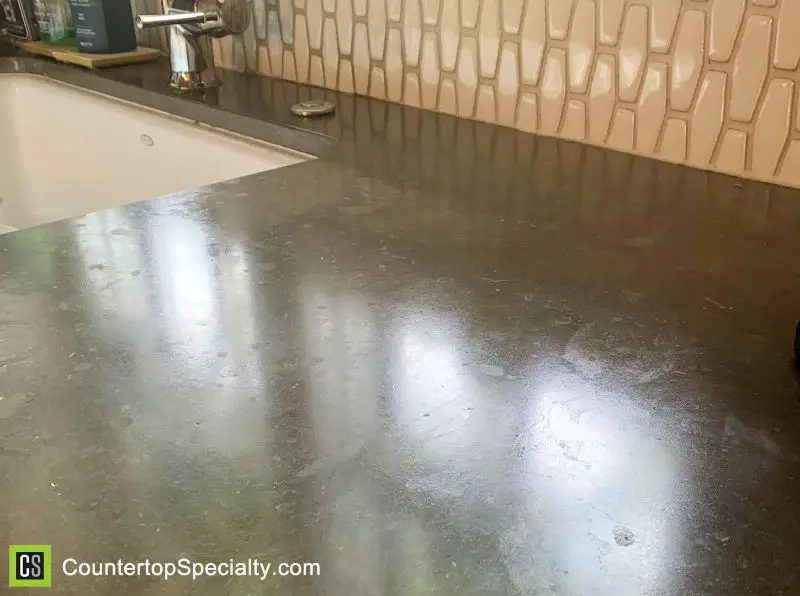Using Epoxy Coating On Limestone Countertops
QUESTION:
Are there any epoxy coatings you would recommend for sealing limestone countertops to protect against acidic food and beverage stains and etch marks?
ANSWER:
It is possible to apply an epoxy coating to countertops to help prevent etching or to completely change the look of the kitchen countertop.However, no, we do not recommend using a permanent topical coating on a limestone countertop or any natural stone. And you cannot use them on floors.
I'll tell you why, but first, let's clarify what we are talking about...
How impregnating stone sealers work is by creating a barrier just below the surface.
Sealers prevent staining by clogging the pores or by creating a repellant barrier.
This prevents any substance, liquid, or spill from absorbing deep into the stone. It stays on the surface and gives you more time to clean up spills so stains don't occur.
Impregnating sealers are made specifically for natural stone and still allow the stone to breathe as it should and do not impede repairs or maintenance in any way.
Impregnating sealers are perfectly fine to use when needed.
Some stones don't need a sealer. Some natural stone varieties are so dense they are naturally stain-resistant... almost stain-proof in some cases.
Applying a sealer to a super-dense stone is either not possible (it won't absorb) or will not improve the stain resistance.
But... impregnating sealers do not prevent etching which is physical damage to the stone. It's like a chemical burn.
Topical coatings are not the same as sealers. Coatings form a permanent barrier over the surface of the stone. Now you have an acrylic or epoxy countertop surface.
Now you have to maintain the coating and not the stone. Coatings have their own weaknesses and maintenance issues. So you trade one type of problem for another.
Coatings do not allow the stone to breathe, which is not entirely detrimental on a countertop since the underside is exposed, but it can create problems.
And applying such topical coatings to floors is out since it will completely suffocate the stone, which can lead to significant damage and deterioration of the stone.
Topical coatings are getting better, but often they can look plastic and they can be a real nuisance if maintenance to the stone is ever required.
The topicals will prevent stains and most acid etching, which is the big selling point.
However, they are not perfect and damage or etching from acids can still occur to the coating and the stone.
It just takes a much longer exposure
Coatings can also get scratched.
Then you have to repair the coating. Usually, only the "certified" installer can make the repair and that is expensive.
Stains and etching seem bad at first, however, they really aren't that big a deal and can be quickly and cheaply repaired by the homeowner in almost all cases.
Staining is adequately controlled by impregnating sealers where necessary, so just not an issue.
True, etching can be a maintenance hassle, especially when a marble or limestone countertop is installed in a kitchen (which is why we and most knowledgeable and reputable installers do not recommend it).
But, etching can be repaired to "like-new" condition in most cases rather easily using ETCH REMOVER / Marble Polishing product on polished (shiny) marble, limestone or travertine.
And on honed etching can be repaired cheaply and quickly in nearly every case following instructions in the Removing Etch Marks ebook.
So, when you are comparing the pros and cons it's a much better idea to try and prevent etching as much as possible (by using coasters, cutting boards, and trivets) and then repair when it occurs than to apply a permanent coating that can have some very negative and costly consequences.
Of course, companies making and selling such topicals will tell you they are a revolution in stone maintenance... the best thing ever.
But if you talk to stone restoration pros (who do nothing but repair and restore vs. install).... they hate topicals.
The great thing about stone and limestone when compared to every other countertop surface is that stone repair and restoration is almost always possible. Often you can restore the surface to a like-new condition.
But once you permanently change the characteristics of the stone by applying a topical coating you permanently change what can be done to the stone.
Of course, there are always exceptions and in a small percentage of cases using a permanent or epoxy coating may be a good option, but not just to prevent etching.
If etch marks were permanent, then I'd probably recommend a coating for limestone and marble kitchen countertops... but etching isn't permanent and can easily be repaired, so applying a topical coating to prevent etching doesn't make sense.
It is ALWAYS best to do as little as possible to stone and leave it in its most natural state.
If you still want to explore this option, these companies offer coatings to help prevent etching: Clearstone, Sheerstone, Tuffskin, Aldon, Kinloch EAP, MORE Anti-Etch.
Comments for Using Epoxy Coating On Limestone Countertops
|
||
|
||
|
||


